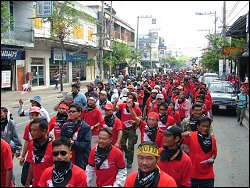
|
Bangkok, January 11, 2006 — As talks take place in Chiang Mai, Thailand, this week on the intellectual property provisions of a proposed US-Thailand Free Trade Agreement, the international medical organization Doctors Without Borders/Médecins Sans Frontières (MSF) warns that acceptance of the US proposal could restrict access to essential medicines in Thailand and endanger the country's national HIV/AIDS treatment program.
MSF is concerned that the US, as it has succeeded in doing in other regional agreements, will push for provisions that could extend patent terms and limit Thailand's ability to protect the health of its people by producing low-cost generic versions of patented drugs.
Although the US proposal remains secret, based on US negotiating positions during other regional agreements, most recently with the Central American Free Trade Area (CAFTA), it is believed that the US will again seek provisions for the protection of intellectual property that far exceed international norms set out by the World Trade Organization (WTO) in the Doha Declaration on the Trade-Related Aspects of Intellectual Property Rights (TRIPS) Agreement and Public Health. The Doha Declaration unambiguously prioritized public health over the protection of intellectual property.
"We fear that if the Thai government accepts the US proposal, doctors in Thailand will face substantial obstacles in providing treatment to their patients living with HIV/AIDS, especially for those that require newer antiretroviral (ARV) medicines to survive," said Paul Cawthorne, MSF Head of Mission in Thailand. "This week, we have seen thousands of Thais demand that their government protect access to medicines and defend the national HIV/AIDS treatment program. For the sake of the thousands of Thais who depend on the low-cost of medicines, we hope they succeed."
Using locally produced medicines, the Thai government has initiated a program of universal access to subsidized treatment that currently reaches over 80,000 Thai people living with HIV/AIDS. MSF has been providing ARV treatment in Thailand for the past five years, and is now providing support to the Thai national program. If the US provisions are accepted, thereby ruling out the generic competition that could drive down prices for newer patented drugs, the Thai government will not be able to continue to expand access to treatment and provide effective second-line drug combinations which are needed when the initial drug combinations no longer work. The current cost of one second-line drug is over $3,500 per patient per year — nearly ten times the cost of the most commonly-used first-line triple combination.
"The US must stop pushing provisions that undermine the international consensus expressed in the Doha Declaration," stated Ellen 't Hoen, Director of Policy Advocacy for MSF's Campaign for Access to Essential Medicines. "If the Thai government accepts the US proposal, it will negate the important steps taken to provide universal access to HIV/AIDS treatment and force people living with HIV/AIDS and other illnesses to pay the price."
MSF has provided HIV/AIDS prevention and care in Thailand since 1995 and began antiretroviral therapy in 2000. MSF and local partners currently provide treatment education, counselling and support services to more than 16,000 Thais receiving antiretroviral treatment through the government program.



